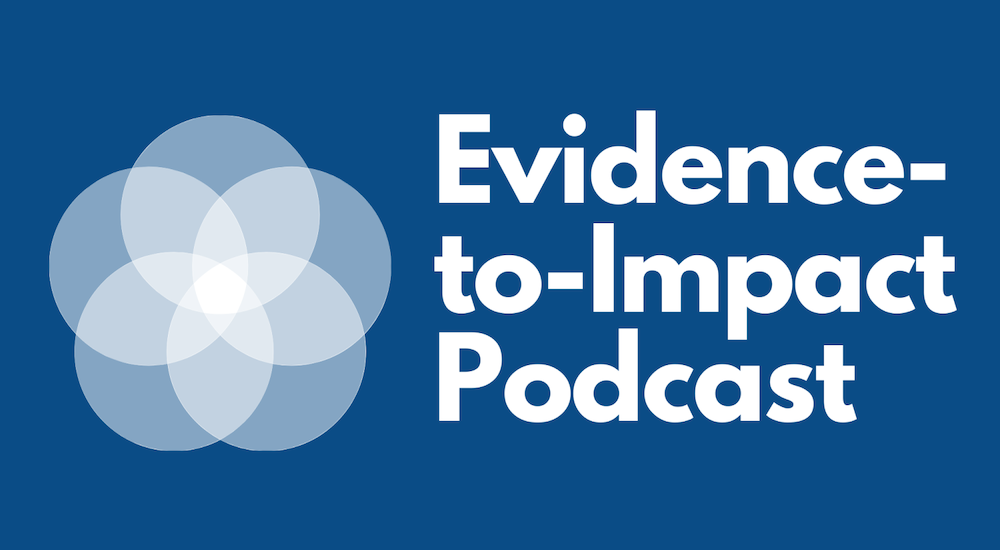New podcast bridges the gap between academia and policymakers
The 'Evidence-to-Impact' podcast invites university researchers and government partners to tackle how to solve issues affecting our communities
Published March 19, 2020

EIC_Podcast_Logo_Big_1_Updated – V3
UNIVERSITY PARK, Pa. — How can academia and government work together to tackle problems? That’s the question that a new podcast launched by the Evidence-to-Impact Collaborative, a unit of Penn State’s Social Science Research Institute, is trying to answer.
The podcast, aptly titled the “Evidence-to-Impact Podcast,” focuses on conversations between Penn State researchers from multiple disciplines and government partners from across the commonwealth about relevant policy issues like poverty, criminal justice, substance abuse and healthcare. The discussions aim to bridge the gap between research insights and real-world solutions through the translation of complex evidence and data into real-world implications and impacts.
To receive updates about new episodes, visit evidence2impact.com to subscribe to the podcast’s mailing list and follow the podcast on Twitter.
“We want to shine a spotlight on how to better collaborate with government partners and how we can use data to build better policies that help our community and state,” said Susan McHale, director of the Social Science Research Institute and distinguished professor of human development and family studies.
Episodes are hosted by Michael Donovan, director of policy and outreach for the Penn State Administrative Data Accelerator and associate director of the Evidence-to-Impact Collaborative. “I think this podcast is an opportunity for the research community and policymakers and practitioners to find common ground, to identify problems that require more attention, and explore ways to better support each other,” said Donovan.
The roster of episodes includes conversations about criminal sentencing with Jeff Ulmer, professor of sociology and criminology, and Mark Bergstrom, executive director of the Pennsylvania Commission on Sentencing; as well as the complex topic of aging, featuring Marty Sliwinski, director at the Center for Health Aging and professor of human development and family studies, and Stephanie Cole, director of special projects and executive assistant at the Office of the Secretary at the Pennsylvania Department of Aging.
The series is produced and recorded in partnership with the Social Science Research Institute, the Clinical and Translational Science Institute, the Administrative Data Accelerator, the Office of the Senior Vice President for Research, and the College of Health and Human Development.
What We Do
Who We Work With
Share This Page
New podcast bridges the gap between academia and policymakers
The 'Evidence-to-Impact' podcast invites university researchers and government partners to tackle how to solve issues affecting our communities
March 19, 2020

UNIVERSITY PARK, Pa. — How can academia and government work together to tackle problems? That’s the question that a new podcast launched by the Evidence-to-Impact Collaborative, a unit of Penn State’s Social Science Research Institute, is trying to answer.
The podcast, aptly titled the “Evidence-to-Impact Podcast,” focuses on conversations between Penn State researchers from multiple disciplines and government partners from across the commonwealth about relevant policy issues like poverty, criminal justice, substance abuse and healthcare. The discussions aim to bridge the gap between research insights and real-world solutions through the translation of complex evidence and data into real-world implications and impacts.
To receive updates about new episodes, visit evidence2impact.com to subscribe to the podcast’s mailing list and follow the podcast on Twitter.
“We want to shine a spotlight on how to better collaborate with government partners and how we can use data to build better policies that help our community and state,” said Susan McHale, director of the Social Science Research Institute and distinguished professor of human development and family studies.
Episodes are hosted by Michael Donovan, director of policy and outreach for the Penn State Administrative Data Accelerator and associate director of the Evidence-to-Impact Collaborative. “I think this podcast is an opportunity for the research community and policymakers and practitioners to find common ground, to identify problems that require more attention, and explore ways to better support each other,” said Donovan.
The roster of episodes includes conversations about criminal sentencing with Jeff Ulmer, professor of sociology and criminology, and Mark Bergstrom, executive director of the Pennsylvania Commission on Sentencing; as well as the complex topic of aging, featuring Marty Sliwinski, director at the Center for Health Aging and professor of human development and family studies, and Stephanie Cole, director of special projects and executive assistant at the Office of the Secretary at the Pennsylvania Department of Aging.
The series is produced and recorded in partnership with the Social Science Research Institute, the Clinical and Translational Science Institute, the Administrative Data Accelerator, the Office of the Senior Vice President for Research, and the College of Health and Human Development.
More News
LET’S STAY IN TOUCH
Join the Evidence-to-Impact Mailing List
Keep up to date with the latest resources, events, and news from the EIC.



